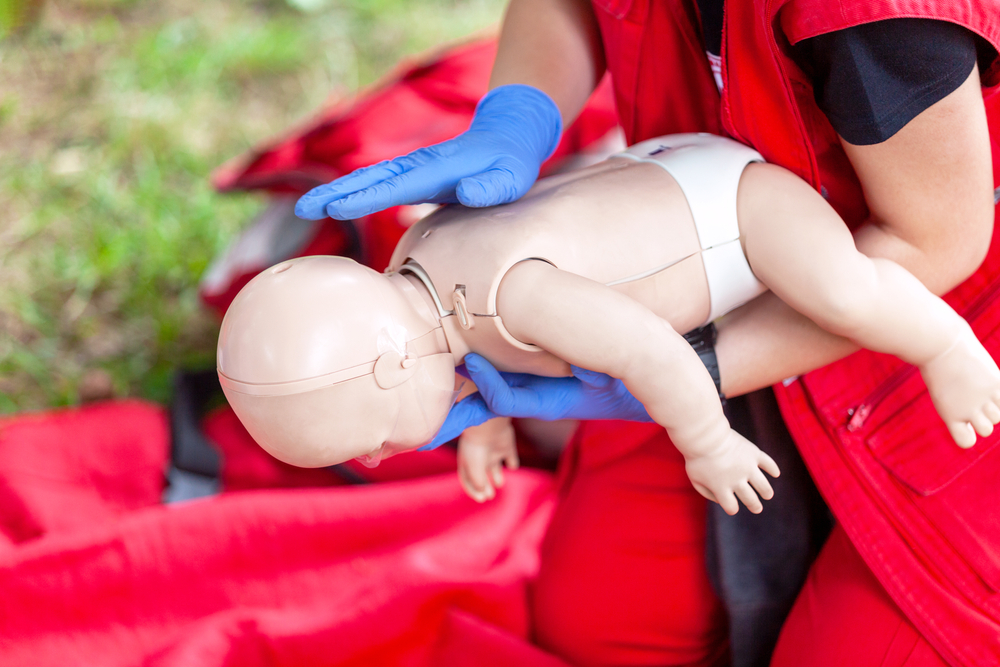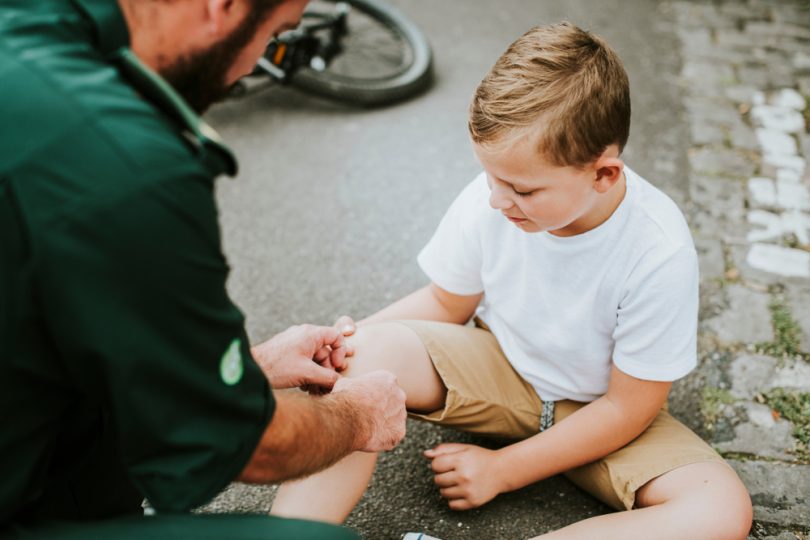Most people understand the importance of knowing first aid today, and yet the majority of British people fail ever to learn any.
Children can learn first aid from an early age, and often retention of information is better then. And the St John Ambulance provides free first aid awareness sessions and online education.
First aid could help prevent a condition from getting worse, and being trained in first aid can mean being able to provide instant attention while waiting for emergency services.
Major A&E departments saw nearly 16.5 million visitors in 2019 in the UK.
When it comes to children, there are around 450,000 visits to A&E departments in England alone every year. And about 45,000 children under five get admitted to hospital each year.
Worryingly, children from the more deprived areas of England are 45% more likely to be admitted to hospital than children from other areas.
Pediatrics is a vital area of healthcare in the UK, and first aid can play an important part too.
If you are planning your college path and have an interest in helping children, here is some information about how to become a pediatric first aider in the UK:
What Is Pediatric First Aid Care?
Pediatricians provide care from birth to adulthood. They are there to help prevent problems in healthy children and to diagnose and treat injuries and illnesses in others.
Pediatric first aid courses are by no means as in-depth as that which a pediatrician has to undergo.
But, it is in many ways just as essential. First aid refers to the initial treatment that a patient will undergo.
If you undertook a pediatric first aid course, you would be competent enough to be the first responder at an incident involving a child or baby.
Pediatric first aid training provides the student with the skills and confidence to approach accidents or other scenarios involving children.
It is vital because it can be the difference between a child’s condition worsening and even becoming fatal before a medical professional can get to the scene.
Why Is First Aid So Important Today in the UK?
The NHS has set a target for ambulances to arrive within 7 minutes for life-threatening conditions. They also expect 90% of ambulances to arrive after call-out within 15 minutes.
Yet, in July this year, the average response time for an ambulance was over 59 minutes. This was for category 2 calls which are classed as emergencies.
Many conditions, such as seizures, can cause permanent harm if not treated swiftly. A long ambulance wait puts people at risk when accidents or illnesses occur.
Having someone instructed in first aid on the scene improves the chances of survival in serious emergencies. Completing a pediatric first aid course means being able to help a child who is seriously hurt and stabilizing them.
With a potentially long wait for emergency services to arrive, this is critical.
How Does Pediatric First Aid Differ From Regular First Aid?
Pediatrics often means dealing with serious illnesses and diseases. A pediatrician can help a child with cancer and mental health, plus the emotional changes that come with this disease.
Children’s physiology and size are very different from adults. They will still be developing cognitively and physically, and they require different care than full-grown adults do, so they have physicians specializing in pediatrics while adults have different doctors.
The training provided to people wishing to become pediatric first aiders is similar to that which is given in first aid at work courses but with differences.
Pediatric first aid courses will concentrate on treating babies and children and not adults.
Pediatric first aid courses follow the framework laid out by the Early Years Foundation Stage. They are Ofsted-approved and may be Continuing Professional Development certified too.
Many first aid courses are aimed at workplace situations involving adults. And for a first aider responsible for both children and adults, such as in a school, two courses would have to be taken; first aid for work and pediatric first aid.
Although some skills can be transferrable, the two courses are not the same.
How Do You Become a Pediatric First Aider in the UK?
If you have decided that you wish or need to become a pediatric first aider then you will need a little information on the best course of action.
If your employer has put you forward for a course then everything should be taken care of, including the cost.
However, if you are intending to pay for a pediatric first aid course yourself then you will want to know the price of the various courses.
Below are a few questions and answers you might have while looking to become a pediatric first aider:
What Is the Cost of Becoming a Pediatric First Aider?
The type of pediatric first aid course you take will determine the cost, but a 12-hour two-day course can be as little as £85 + VAT. This particular course includes 6 hours of hands-on training and 6 hours of online learning.
Blended pediatric first aid courses are recognized by the Department of Education and offer a way to learn for those whose time can be limited, such as parents.
Where Can You Go to Become a Pediatric First Aider?
In some circumstances, you may be able to convince your employer to put you on a pediatric first aid course, or you can take one while you are in college.
If your job involves being responsible for children, or the employer’s business revolves around children, then they may agree to cover the costs and find you a course.
Alternatively, you can search online for private courses and choose one that suits your needs.
There are many different pediatric first aid courses, from basic level to advanced. Some are also catered specifically for certain areas, such as schools.
Your local Red Cross and St John Ambulance will also be able to help you qualify as a pediatric first aider.
How Long Will the Course Last?
Pediatric first aid courses typically last from 1 to 3 days.
A pediatric emergency first aid course may be just 6 hours and a blended course up to 3 days, with the third day concentrating on e-learning.
To become a complete pediatric first aider, you will need to acquire a level 3 certificate.
Combined first aid at work with pediatric first aid will likely involve a 3-day course. During the course, you will learn a mixture of theory and hands-on skills.
Do You Need Refresher Training for Pediatric First Aid?
Your pediatric first aid certificate will last for three years on successful completion of the course.
Nevertheless, it is recommended that refresher training is undertaken every year. This is usually a short practical course that lasts just a few hours and is scenario based.
Are All Pediatric First Aid Courses Accredited and Certified?
Every pediatric first aid course should meet certain standards and meet a set framework.
Make sure the course you take meets the Department of Education’s recommendations and is Ofsted-approved.
What Will You Learn on a Pediatric First Aid Course?

A pediatrician’s role is to help children with their physical health, provide preventative care to healthy children, and assist with emotional and mental wellness in youngsters.
NHS Health Careers notes that qualifying as a pediatrician takes a number of years.
But, a pediatric first aider’s role is to provide immediate support and attention after an incident occurs.
It won’t take you 10 years to become a pediatric first aider, but your skills will be no less important, and you will learn many.
If you attend a pediatric first aid course you will learn how to assess an emergency situation and provide prompt care to those affected.
The areas covered in a pediatric first aid course include the following:
- Burns and scalds
- Cuts and bleeding (minor and serious)
- Choking in children and babies
- Asthma attacks
- Allergic reactions
- Poisoning
- Seizures
- Head trauma
- Broken bones
- Sprains
Young children are curious and love to put things into their mouths. Choking is one of the most common situations that need immediate care.
Yet, 55% of parents say that they lack the skills to react to this kind of emergency.
Who Should Take a Pediatric First Aid Course?
Anyone responsible for children or is studying for a career that involves children can benefit from taking a pediatric first aid course, such as:
- Teachers
- Early years providers
- Baby sitters
- Nannies
- Preschool employees
- Nursery employees
- Teaching assistants
Also, parents may want to consider following a pediatric first aid course.
Childhood accidents and illnesses are common and are part of growing up in some ways.
As a parent, you will encourage your teens to stay active, but injuries can occur. Knowing first aid means you can treat an injury or wound efficiently and possibly without further medical attention.
Around 62% of parents say that knowing first aid would make them feel more confident about looking after their child. So it makes sense that parents learn some first aid, even if just for emergencies.
Indeed, any individual can embark on a first aid course under their own steam. The more people qualified in emergency first aid and pediatric first aid, the safer everyone will be in general.
Summary
Anyone wishing to become a pediatric first aider need only sign up for the appropriate course.
If you are responsible for children then you can ask whether your employer needs a new first aider. Perhaps they haven’t yet met their quota, or a current first aider is leaving.
As an individual, you can approach one of the many companies that offer skills-based training and enquire about pediatric first aid.
When your course ends, you will be qualified to provide on-the-spot immediate care for children.
You should have the tools needed to assess various scenarios and stabilize patients while waiting for the professionals to arrive.
A quick refresher course once a year and a renewal of your certificate every 3 years, and you will be provided with skills you can take through your whole life as a pediatric first aider.







